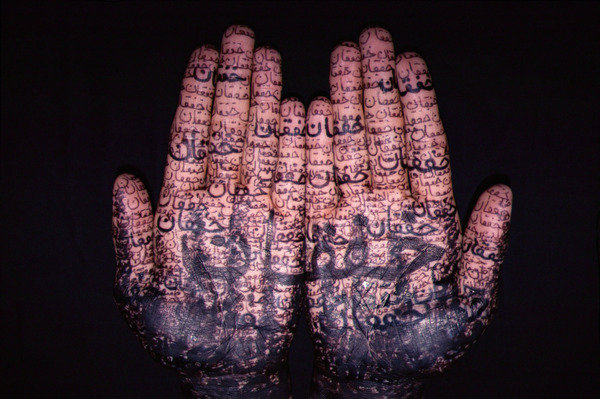Nietzsche was a man
dal 9/4/2014 al 14/6/2014
Segnalato da
Fereshteh Alamshah
Morehshin Allahyari
Maneli Aygani
Neda Darzi
Mozhgan Erfani
Samira Eskandarfar
Celia Eslamieh Shomal
Roxy Farhat
Tara Goudarzi
Samira Hashemi
Haleh Jamali
Gelare Khoshgozaran
Shahrzad Malekian
Azadeh Nilchiani
Raha Rastifard
Farideh Shahsavarani
Alysse Stepanian
Parya Vatankhah
Raheleh (Minoosh) Zomorodinia
9/4/2014
Nietzsche was a man
Malmo Konsthall, Malmo
Video art by 19 Iranian women. The exhibition reveals perspectives on the questions faced in a volatile world of interrelationships, misapprehensions and hierarchies: gender communication, prejudice and shifting identities, violence and war and the relationship between humans, non-human animals, nature, and the environment.

Curated by Alysse Stepanian (USA) and Neda Darzi (Iran)
This exhibition of contemporary video art represents work by three generations of Iranian women currently living in seven countries. Historically Iranian filmmakers have captured the attention of international audiences with their powerful work. With the increasing accessibility of video technology and the use of the internet, many artists have crossed disciplines, encouraged by the potential to disseminate their work worldwide, and the relevance of digital art in contemporary society and culture. In this curation nineteen artists reveal unique perspectives on the questions faced in a volatile world of interrelationships, misapprehensions and hierarchies. The voices of these women resonate around the globe with challenging works that examine universal issues such as gender communication, prejudice and shifting identities, violence and war, and the relationship between humans, non-human animals, nature, and the environment.
Much debate has been centered around the seemingly misogynistic views of 19th Century German philosopher, Friedrich Nietzsche. Frances Nesbitt Oppel’s rereading of his aphorisms suggests that his remarks were ironic strategies designed to expose the hierarchical dualisms of Western thought and language, and to “ask us to question the ways in which we think about gender conventions” (Oppel, p. ix). Vanessa Lemm writes, “He [Nietzsche] believes that human life is inseparable from the life of the animal and of the whole organic and inorganic world” (Lemm, p. 4). In the English language, the word ‘man’ or ’mankind’ is often used to refer to the ‘human’ species in general. The title of this show points to the prevalent dualistic patriarchal worldview that subordinates and exploits nature and the powerless, separates men from women, and humans from animals.
The videos in this exhibition are grouped under six thematic headings: “Nature”, “Self”, “Walls”, “Defiance”, “Violence”, and “Displacement”. Although these works could be interpreted in multiple ways and grouped differently, Alysse Stepanian have tried to identify commonalities while remaining true to the artists’ original intentions.
Participating artists
Fereshteh Alamshah (Iran)
Morehshin Allahyari (USA)
Maneli Aygani (USA/Iran)
Neda Darzi (Iran)
Mozhgan Erfani (France)
Samira Eskandarfar (Iran)
Celia Eslamieh Shomal (Netherlands)
Roxy Farhat (Sweden)
Tara Goudarzi (Iran)
Samira Hashemi (Iran/USA)
Haleh Jamali (UK)
Gelare Khoshgozaran (USA)
Shahrzad Malekian (Iran)
Azadeh Nilchiani (France)
Raha Rastifard (Iran/Germany)
Farideh Shahsavarani (Iran/USA)
Alysse Stepanian (USA)
Parya Vatankhah (France)
Raheleh (Minoosh) Zomorodinia (USA)
Transmedia artist, writer, curator, and “animal” advocate, Alysse Stepanian was born in Iran and currently lives in Southern California. She is a Master of Fine Arts graduate and her work is socially and politically engaged. Her videos, installations, paintings, photographs, web art, performances and curations have been presented in over 250 shows in 45 countries.
Image: Mozhgan_Erfani (Paris/France), Khafaqan, 2004. 1:18 min, color, sound
Public relations officer
Lena Leeb-Lundberg +46 40-34 12 94 lena.leeb(at)malmo.se
Malmö Konsthall
S:t Johannesgatan 7, SE-205 80 Malmö
Opening hours
Daily 11-17
Wednesdays 11-21
Closed: Midsummers eve, Midsummers day,
24/12, 25/12, 31/12 and during installation.
Admission free



